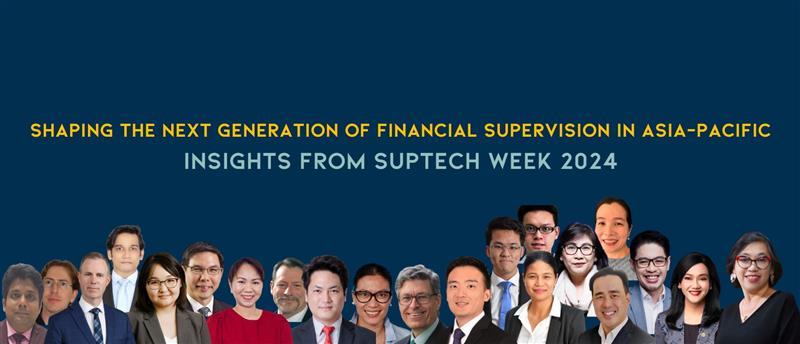The journey from the RegTech for Regulators Accelerator (R²A) to the Cambridge SupTech Lab
Five years ago, I was in Manila to conduct the first suptech diagnostic for the newly launched RegTech for Regulators Accelerator (R²A). It was a Monday afternoon, and I was sitting in Pia Roman’s office at the headquarters of the Central Bank of the Philippines (BSP). Pia – who is currently the Director of the Office of the United Nations Secretary-General’s Special Advocate for Inclusive Finance for Development (UNSGSA) – was leading the BSP market conduct unit.
Pia and I had known each other for several years, and she had kindly made time in her busy schedule to see me. We chatted about life, our kids, Britain’s invocation of Article 50 of the Lisbon Treaty, the roar of Bitcoin at USD1,300, and how the upcoming diagnostic might look. As she sat opposite me, I could barely see her over a tall wall of papers and folders on her desk.
I was enjoying catching up with her and was happy to wait until the next day to start our work. But the wall of papers had raised a question, and if you know me, you will know that I just can’t ignore the elephant in the room. ‘Pia, may I ask you what all these papers are about?’ She paused. Breathed with intent. And in that short silence, the R²A journey and my journey in suptech began.
Tackling a supervisor’s challenge
It turns out that the huge file pile contained all of the complaints that the department had received the week before, along with her team’s notes and replies. According to the regulations, every complaint had to be answered in writing by the Central Bank. So every Monday, Pia reviewed her team’s notes and then either reevaluated the entire file or signed the written reply to be sent out to the customer. Same process, over and over, for each complaint.
Clearly, this was a lot of work. And I learnt that two-thirds of the complaints should have never made it to Pia’s desk in the first place. Some of them were outside of the bank’s purview (such as issues related to mobile network resilience that are under the jurisdiction of the telecommunication authority). For others, a complaint had never been filed with the financial service provider in the first place. This meant that over half of Pia’s team’s time was spent on issues that were entirely outside of their scope of work.
There was more. Even though the wall of papers was tall, the number of complaints seemed low to me, given the level of financial access and usage in the country. Pia agreed. There also seemed to be a disproportionate number of complaints filed in Manila compared to elsewhere in the country…as if the rest of the country was not experiencing any issues worthy of complaint.
Finally, I learnt that even after putting in all this hard work, the BSP didn’t have the time or the tools to analyse the complaints to get reliable insights into Filipinos’ experience with financial services and the challenges they were facing. Only a little bit of information about the complaints was being captured in an Excel tracking file.
In just a few minutes, Pia and I had already reached the core of our diagnostic. How could we democratise consumer protection to make it easier for all Filipinos – not just Manila residents – to access BSP’s complaints and resolution mechanisms? If we succeeded in doing so, how could we avoid overwhelming Pia’s team with a sudden rush of complaints? Could we handle complaints digitally and reduce false positives? If so, this would allow the team to redirect two-thirds of their time and resources towards analysing the complaints, so they could generate intelligence to improve supervision and regulation.
Ready to roll with R²A
I was still jetlagged, but my inner nerd was awake and excited. Pia had just presented a problem that I knew we could address. A year earlier, in January 2016, I had met with Matt Homer (at that time with USAID, the first sponsor to support R²A) and David Porteous (founder of the consulting firm BFA Global) to draw the foundations of R²A. The initial goal of R²A was to investigate demand and readiness from central banks for upgraded supervisory applications and methodologies and to find out if it was possible to bring agile development into the public sector. At that first meeting in snowy Boston, we had discussed different use cases and potential suptech tools to bring financial supervision into the 21st century.
So on my way down in the elevator of the BSP, I was already texting David, Matt and Matt Grasser – the technologist who helped me build R²A and has now joined me in leading the Cambridge SupTech Lab – to share my conversation with Pia. One of the tools we had long wanted to test was a central bank chatbot to handle customer complaints. A list of questions was crowding my mind. Could we build a chatbot that could:
- speak both English and Tagalog, as well as Taglish (the mixture of Tagalog and English commonly spoken)
- work seamlessly on smartphones and feature phones through SMS so that all Filipinos could access this new channel
- be smart enough to filter the complaints that should have been brought to the attention of the BSP Market Conduct team and redirect the others to the pertinent authorities or financial service providers
- be supported by a backend system that would allow available data to be gathered from other channels that collect/file complaints and then analyse it to create accessible intelligence for timely market conduct supervision and insights for regulatory development?
We came to a positive answer by crowdsourcing solutions through a global competition. By August 2018, through a collaborative development process involving the BSP and R²A teams, and the tech vendor Proto.ai, the BSP Online Buddy – or Bob – was deployed in the Philippines. Although it is still being finetuned, Bob has all those features that were on my list. Thousands of Filipinos have already used the application and three countries in sub-Saharan Africa are also currently looking into adopting a version of Bob, which makes it, I believe, the first of a new generation of artificial intelligence-powered suptech solutions to be scaled across jurisdictions.
Suptech begins to bloom
By 2019, we had successfully developed two cutting-edge suptech solutions and had worked with the Bank for International Settlements (BIS) on workshops, bootcamps, and co-authored publications. R²A had a pipeline of over 20 central banks who wanted to move the frontier of financial supervision. However, R²A was lacking funds and I was burned out, so R²A went on a hiatus, and I went on sabbatical. We closed the project by successfully engaging with the G20 Saudi Presidency and the BIS Innovation Hub to create and implement the 2020 Global SupTech TechSprint.
Challenges still remain. Even though suptech has now become a buzzword, the BIS has expanded its suptech vision and capabilities, and some financial authorities have deployed new applications and developed roadmaps for digital transformation, there is still an enormous amount of work to do to bring financial supervision into the 21st century. And there are unprecedented opportunities to redefine the supervisory processes and redesign the related tools.
That’s why I was so excited when, in 2021, Robert (Bob) Wardrop and Bryan Zhang of the Cambridge Centre for Alternative Finance (CCAF), and Anna Wallace of the Bill & Melinda Gates Foundation reached out to ask: Can we design a programme to deliver cutting-edge suptech applications on a large scale while building capabilities within the supervisory authorities to digitally transform financial supervision into the future? Again, the answer was yes – and, after a few months working on the whiteboard, the Cambridge SupTech Lab was born.
A home for suptech: The Cambridge SupTech Lab
With support from the Bill & Melinda Gates Foundation, the Judge Business School at the University of Cambridge has brought together the rigorous research, training and community capabilities of the CCAF with R²A’s expertise in diagnostic, marketplace build and solutions development. This is the first time that a major academic institution has launched a structured, comprehensive initiative to enhance innovation in financial supervision, and in such an innovative way – by linking leadership development and education, ground-breaking research and a new suptech application foundry.
We have designed the Cambridge SupTech Lab to meet the challenges of scalability, portability and long-term impact. The Lab gives financial supervisors the training and tools they need to develop solutions to those challenges and transform their organisations. The initiative will also be a cornerstone of suptech ecosystem development by providing intentional support and space for financial authorities and technology vendors to grow and connect.
The Lab is a new home for supervisors who are ready to lead a new wave of innovation in financial sector supervision. Through our online Leadership Programme, they will join a community of peers to access world-class research, training and a digital toolkit for market and regulatory intelligence. We will also provide them with a new digital tool that imports all of our diagnostic expertise for digital transformation so they can co-develop maps of their use cases, data and tech stacks to create roadmaps and proofs of concept (PoCs).
The curriculum will include technical topics (including business analysis, data science, cybersecurity and product lifecycle management) so that participants can work to create real impact. It also includes transformative leadership elements to help them build presence, confidence and compassion. By empowering them, our vision is to disrupt both traditional technical assistance and dependence on international experts. We will connect this community of Cambridge SupTech Lab Innovation Leaders with technology vendors, entrepreneurs, expert product managers, designers, coders, business strategists, and research and regulatory specialists from partnering organisations. They will learn and engage in working groups, collaborative research projects, roundtable events, webinars, and much more.
Supervisors (and their colleagues involved in research, data management and tech development) can enrol in the Programme individually or as a team representing their financial authority (where they will have access to 90 scholarships of USD2,800 each). This gives agencies an incentive to partner with the Lab in a structured way, including on capstone projects to develop PoCs that will be the foundation for our global competitions (e.g., techsprint and grant challenge). These competitions will crowdsource ideas that complement the capstone projects and also identify vendors who will receive an award for developing the applications. By bringing supervisors together from at least 15 financial authorities into the Programme, we aim to conceptualise the applications so that they are portable and scalable by design.
Our first cohort will focus on consumer protection and market conduct supervision related to the risks and opportunities presented by new financial technologies. This topic offers fascinating opportunities to work on problems and solutions that directly affect millions of financial users and thousands of financial institutions, and – while we work on the digital tools and the foundation research – we are looking forward to kicking off the Leadership Programme in September 2022.
We also hope to find sponsors and partners to extend our agenda to other subjects, such as anti-money laundering (AML), environmental, sustainability and governance (ESG) risks, crypto and central bank digital-currencies (CBDCs).
Leading a wave of innovation
With the Lab, I am confident we will break new ground in financial supervision technologies. But to create sustainable innovation with long-lasting impacts, we must look beyond business cases and technical specifications. To drive deep transformation, we need to infuse in our work a new culture. Agile development, human-centred design (HCD) and other process-oriented techniques will support the shift we aim to instigate. Also critical is a leadership style that nurtures cooperation, trust and exploration, harnessing creativity to empower people and bring innovation to life. My goal is to invite communication techniques (e.g., deep listening and non-violent communication) and consciousness-based practices into this space that will enable each of us – from the Lab’s team to the experts that will enrol in the Leadership Programme – to embody an evolved version of the Innovation Leader.
I want to express my true gratitude to all my colleagues who have been involved in the development of the Lab so far. The Cambridge SupTech Lab’s core team (Matt, Juliet, Jose Miguel and Heather), Anna, Bob and Bryan for their incredible support and trust, Hunter for his clarity and for always having our back, Herman, Jill, Grisha, Manos, Dee, Neil and Anton at the CCAF, and the team of developers from Group BWT who continues to work with us from Ukraine – thank you so much, my prayers are with you.
Let this new journey begin. I invite you to read our manifesto, and please reach out with any feedback and ideas for collaboration. The Cambridge SupTech Lab provides a unique opportunity to create an environment where innovators can thrive and true leadership can flourish. Our intention is to make this initiative an open platform – let’s build the future of financial supervision, together!












